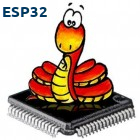-
Notifications
You must be signed in to change notification settings - Fork 345
build
Clone the MicroPython repository
git clone https://github.com/loboris/MicroPython_ESP32_psRAM_LoBo.git
Xtensa toolchains and esp-idf are provided as tar archives. They will be automatically unpacked on first run of BUILD.sh script
Warning:
If running on Windows, you may get false error unpacking 'esp-idf' FAILED.
Run ./BUILD.sh again, the toolchain will be unpacked successfully.
Change the working directory to MicroPython_BUILD directory
To change some ESP32 & Micropython options or to create initial sdkconfig run:
./BUILD.sh menuconfig
To build the MicroPython firmware, run:
./BUILD.sh
You can use -jn option to make the build process faster. If using too high n the build may fail because of race condition, if that happens, run build again or run without the -j option.
If no errors are detected, you can now flash the MicroPython firmware to your board. Run:
./BUILD.sh flash
The board stays in bootloader mode. Run your terminal emulator and reset the board.
You can also run ./BUILD.sh monitor to use esp-idf's terminal program, it will reset the board automatically if the hardware supports that feature.
After changing sdkconfig.h (via menuconfig) it is recommended to run ./BUILD.sh clean before new build
Included BUILD.sh script makes building MicroPython firmware easy.
Usage:
.BUILD.sh <options> <commands>
| Option | Function |
|---|---|
| -jn | use multicore build, runs much faster. Replace n with the number of cores on your system |
| -v or --verbose | verbose output |
| -f8 or --flashsize8 | build for 8MB Flash |
| -f16 or --flashsize16 | build for 16MB Flash |
| -fs N or --fssize=N | force file system size to N KB; default: fit the Flash size |
| -a N or --appsize=N | force application size to N KB; default: auto detect needed size; the actual size will be 128 KB smaller then the declared size |
| --force2p | force 2 partition layout on 16MB Flash when OTA is used |
| --force3p | force 3 partition layout on 8MB Flash when OTA is used |
| Command | Function |
|---|---|
| all | run the build, create MicroPython firmware |
| menuconfig | run menuconfig to configure ESP32/MicroPython |
| clean | clean the build |
| flash | flash MicroPython firmware to ESP32 |
| erase | erase the whole ESP32 Flash |
| monitor | run esp-idf terminal program |
| size | display static memory footprint of the firmware |
| size-components | display detailed memory footprint of the firmware |
| size-files | display detailed memory footprint of the firmware |
| makefs | create SPIFFS file system image which can be flashed to ESP32 |
| flashfs | flash SPIFFS file system image to ESP32, if not created, create it first |
| copyfs | flash the default SPIFFS file system image to ESP32 |
| makefatfs | create FatFS file system image which can be flashed to ESP32 |
| flashfatfs | flash FatFS file system image to ESP32, if not created, create it first |
| copyfatfs | flash the default FatFS file system image to ESP32 |
As default the build process runs silently, without showing compiler output. You can change that by using -v or --verbose option.
To build with OTA partition layout sellect in menuconfig
→ MicroPython → Use OTA partition layout
To build with psRAM support:
In menuconfig select
→ Component config → ESP32-specific → Support for external, SPI-connected RAM
It is recommended to select
→ Component config → ESP32-specific → SPI RAM config → Make RAM allocatable using heap_caps_malloc
but other options will also work.
To update to the latest commits, go to MicroPython_ESP32_psRAM_LoBo directory and execute:
git pull
If you get the warning:
error: Your local changes to the following files would be overwritten by merge:
....
....
Please commit your changes or stash them before you merge.
you may execute:
git stash
and execute the git pull again.
After some major updates, your build environment will be cleaned. In that case you will need to run ./BUILD.sh menuconfig first.
